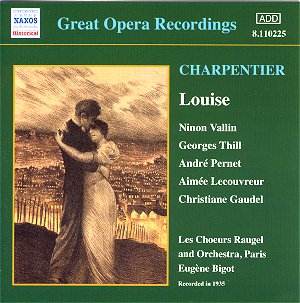In
its pre-war recording history, Charpentier's 'Louise' has been
relatively lucky. There is a live recording of the complete opera
from the Met with Grace Moore in the title role, conducted by
Beecham, recorded in 1943. Moore also recorded a film of the opera
(much shortened to 69 minutes) in 1938, directed by Abel Gance
and with Georges Thill as Julien. Thill reappears as Julien on
this earlier recording of the opera. Made in 1935, with Ninon
Vallin as Louise it was conducted by Eugène Bigot. Again
it is shortened, but with the aid of the composer. This version
concentrates on Louise, Julien and Louise's father. Neither Louise's
mother nor the crowds get much of a look in. The effect is to
create a reasonably concentrated drama, but you lose the sense
that it is Paris herself who is one of the stars of the opera.
Where
this set scores, is of course in its glimpse of a lost tradition
of French performance of French opera. Whilst we must regret that
the complete 'Louise' was not recorded we can surely be thankful
that so much of the opera was committed to disc.
'Louise'
is in many ways a remarkable opera. Though premiered in 1900 it
can reasonably be considered the first 20th century
opera. With its working class milieu, its lively, free-spirited
heroine, her troubled relationship with her parents and the issues
of domestic violence, it encapsulates many themes that would be
developed in the 20th century. You could image large
sections of the story being set, in an expressionist manner, by
someone like Schreker. But this working class heroine is not linked
to expressionist or serialist German music, but to the glorious
world of late 19th century French opera. The opera
is forever associated with Mary Garden who made her debut in the
role of 'Louise' early on in the first run of the opera. She caused
a sensation, possibly because the free-spirited heroine was so
similar to her own personality. It is to be regretted that more
of her interpretation was not captured on disc.
Ninon
Vallin was a soprano who sang mezzo-roles such as Carmen and Charlotte.
As Louise she is vibrant and earthy. She creates a believable,
feisty heroine and her version of 'Depuis le jour' is robust and
urgent. She does not sing it with the exquisite, floated tone
that we have become accustomed to when the aria is done as a soprano
show piece. But her interpretation fits her conception of the
role and commentators have pointed out that it has much in common
with Mary Garden's late recordings (they were issued on Romophone
in 1994).
As
Julien, Georges Thill is seductive and thrilling. His sort of
heroic French tenor has become virtually extinct and only in recordings
like this can we experience something of the power and the passion
that he brought to the role.
The
only other major soloist to be featured on this recording is Andre
Pernet as Louise's father. His is a wonderfully warm, rounded
portrait, creating a believable character, rather than a ranting
villain. But he and Vallin still make sparks fly during their
row in the final scene.
There
is one extra item on this disc, a performance by Maurice Dutreix
of an aria from 'Julien', Charpentier's follow-up to 'Louise'.
This never had the success of 'Louise' so it is all the more welcome
to have the tantalising historic fragment.
If
you love 'Louise' then you will want this recording as a record
of a lost performance tradition. But if you are looking for a
complete recording of 'Louise' then the recommendation must still
be Fournet's 1956 recording from the Opera Comique with Berthe
Momart and André Laroze.
Robert
Hugill
